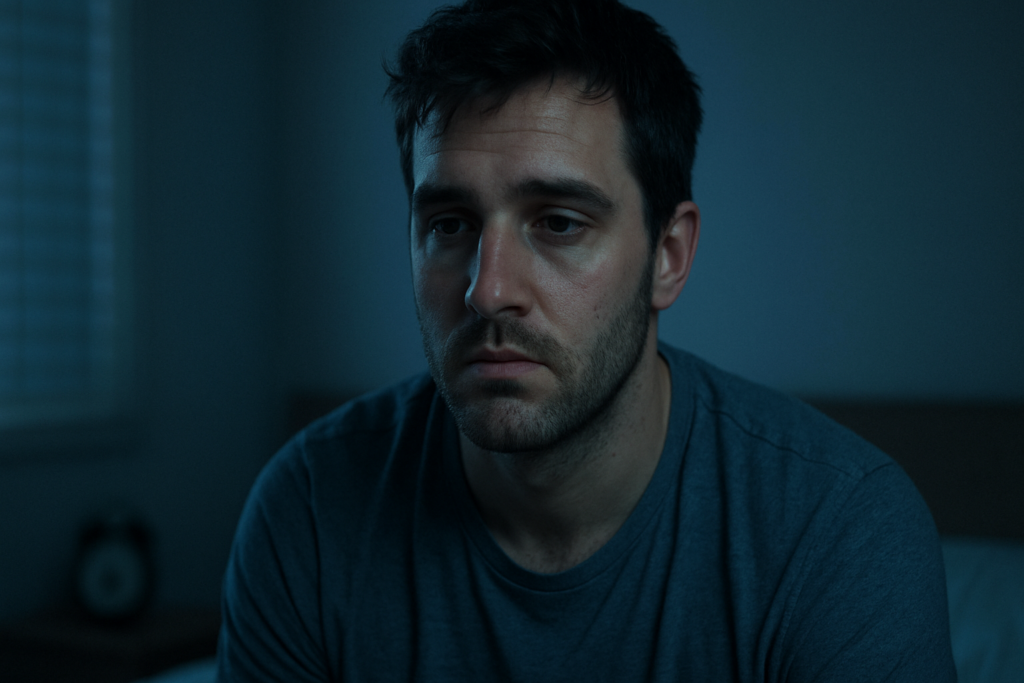It’s 3:47 AM. I know because I’ve been watching the clock since 11:23, when I fell into bed completely drained. My body feels like concrete. My eyes burn. Every part of me begs for sleep.
But here I am, wide awake, mind racing like a searchlight that won’t turn off.
This is the nightmare of being too tired to function but too wired to sleep. Your body and mind are at war, and you’re caught in the middle. You can’t think straight, but you can’t stop thinking either.
This isn’t about drinking less coffee or taking melatonin. It’s about invisible battles happening inside you—battles that turn exhaustion into alertness, keeping you awake when you need rest most.
1. Your brain still thinks you’re in danger
Somewhere along the way, your nervous system learned that staying alert meant staying safe. Maybe you grew up in a house where you never knew what mood would walk through the door. Maybe you had a partner who kept you walking on eggshells. Maybe work became a place where one mistake meant disaster.
The danger is gone now, but nobody told your brain. It’s still standing guard, still scanning for threats that don’t exist anymore. Every noise could be footsteps. Every notification might be bad news. Your bedroom feels safe, but your body doesn’t believe it.
When people experience trauma, their brain can get stuck in protection mode. This state of constant alertness floods your body with stress hormones that make sleep impossible. Even when you’re exhausted, these chemicals keep you ready to fight or run.
The very tiredness that should knock you out becomes the thing that keeps you up. Your brain thinks: “We’re vulnerable when we’re this tired. Better stay alert.” The system meant to protect you has become your prison.
2. All the feelings you pushed down during the day
During daylight hours, you’re too busy to feel. There’s work to do, kids to feed, bills to pay. No time for grief about what you’ve lost. No space for anger about what was taken. No room for fear about what’s coming.
But at night, when everything goes quiet, those feelings rise up. They don’t come as clear thoughts. They come as body sensations—tightness in your chest from tears you haven’t cried, knots in your stomach from anger you’ve swallowed, that buzzing under your skin from stress your body needs to release.
Research shows that we process emotions during sleep, especially during dream sleep. When we don’t deal with our feelings during the day, they demand attention at night. But dealing with them means feeling them, and that can be overwhelming.
Sleep requires letting your guard down. But letting your guard down means feeling everything you’ve been running from all day. So you stay awake—exhausted but defended, too tired to process but unable to rest without processing.
3. Fighting tomorrow’s battles tonight
Next week’s presentation. That difficult conversation you’ve been avoiding. The doctor’s appointment. The deadline. The confrontation. At 2 AM, next Tuesday feels like tomorrow morning. Your brain rehearses scenarios, prepares responses, fights battles that haven’t happened yet.
Your body can’t tell the difference between real threats and imagined ones. When you worry about the future, your stress system activates just like it would if the threat were happening right now. Your heart rate goes up. Stress hormones flood your system. Your body literally prepares for combat while you’re lying still in bed.
Studies show that chronic worry keeps your stress response constantly activated. This makes your body produce too much cortisol—the hormone that’s supposed to wake you up in the morning but is now keeping you up all night.
You’re using energy you don’t have to fight problems that don’t exist yet—and might never exist at all.
4. Trying too hard to sleep
“I have to sleep. If I fall asleep now, I’ll get five hours. Now four and a half. Now four.”
The desperate math of insomnia. The pressure to sleep perfectly becomes the very thing preventing sleep. You’re failing at rest, which feels like failing at everything, which creates more pressure, which creates more wakefulness.
Research on perfectionism and sleep reveals a cruel paradox: the harder you try to sleep, the less likely you are to succeed. When your mind sees you trying hard and analyzing the problem, it thinks there must be danger. To help you handle this “danger,” it makes you more alert—the opposite of what you need.
People who struggle with perfectionism often have the worst insomnia. They need to control everything, even sleep. But sleep can’t be controlled. It happens when you stop trying, and for perfectionists, not trying feels like giving up.
The need to sleep “correctly” turns rest into another performance, another place to fail.
5. Not knowing who you are anymore
Who are you when everything that defined you has changed? The career that ended. The relationship that fell apart. The kids who left home. The role that no longer fits.
These questions don’t have 3 AM answers, but your tired brain keeps searching. It scrolls through possibilities, regrets, different versions of your life where you made other choices. Who could you have been? Who might you still become? Who are you right now?
When people go through major life changes, they often experience an identity crisis. You’re questioning who you are, what matters to you, where you’re going. This is normal, but it’s also exhausting.
Your brain needs a clear story about who you are to feel safe enough to sleep. When that story falls apart—through divorce, job loss, illness, or just the passage of time—your mind works overtime trying to write a new one.
But rebuilding your identity takes energy you don’t have. And not knowing who you are feels too scary to sleep through. So you lie there, exhausted, trying to think yourself back into existence.
6. Saying yes when you mean no
Every yes that should have been a no piles up in the darkness. The extra project you couldn’t refuse. The favor that became an expectation. The emotional support you give but never receive. They accumulate—resentments keeping you awake, anger your daytime self won’t admit.
Your days are overfull because you can’t say no. Your nights are sleepless because your body is finally saying no for you. This is your system’s protest—refusing to cooperate with a life that doesn’t respect your limits.
Research on boundaries and burnout shows that people who can’t set limits often feel exhausted, resentful, and overwhelmed. These feelings build up during the day and explode at night when there’s nothing to distract from them.
Without boundaries, you’re living everyone else’s life instead of your own. Your insomnia is your authentic self’s last stand—the part of you that knows this isn’t sustainable, that something has to change.
7. The terror of letting go
Sleep is the ultimate surrender. You become unconscious, defenseless, trusting the world to hold together without you watching. For those who’ve learned that control equals survival, this feels impossible.
Maybe you grew up in chaos and learned to stay vigilant. Maybe someone betrayed you and now trust feels dangerous. Maybe life taught you that letting your guard down means getting hurt.
Every night becomes a battle. Your body begs for release. Your mind insists on standing guard. You become both the prisoner and the guard, unable to rest because rest means vulnerability.
Studies on fear of sleep show it’s especially common in people who’ve experienced trauma. The need to stay alert becomes so strong that even exhaustion can’t override it.
For these people, being unconscious feels like being in danger. Letting go feels like dying, even though holding on is slowly killing them.
The bottom line
These battles aren’t character flaws. They’re not weakness. They’re protective mechanisms that once kept you safe but now keep you awake. Your exhausted insomnia isn’t random—it’s your system’s way of saying something needs attention.
The cruel irony: healing requires the energy that sleeplessness steals. You need rest to do the work that would allow you to rest. It feels impossible, like a snake eating its own tail in the dark.
But understanding helps. You’re not broken, just fighting old battles. Not weak, just worn out from invisible wars. Not failing at sleep, but stuck in outdated protection mode.
It’s 4:15 AM now. Still awake, still exhausted. But somehow, naming these battles makes them feel less urgent. They’re like old soldiers who don’t know the war has ended. Maybe tonight they’ll stand down. Maybe tomorrow.
Or maybe this is simply how warriors sleep—one eye open, even in peacetime. Even when the only enemy left is the ghost of old dangers. Even when the body begs for mercy the mind can’t quite grant.
Yet.







